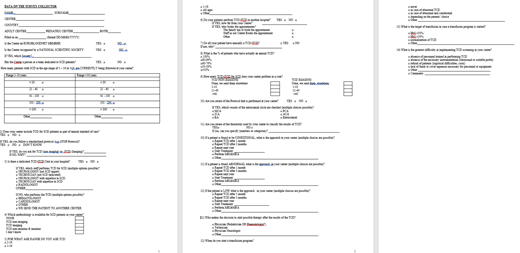Abstract
Background:
Children with sickle cell disease (SCD) are at increased risk of cerebrovascular events such as stroke, silent infarcts and neurocognitive impairment. The role of Transcranial Doppler ultrasound scanning (TCD) to identify sickle cell anemia (SCA) children at high risk of stroke is well established. Adam et al in 1998 recommended those with abnormal cerebrovascular flow velocities are offered prophylactic blood transfusion therapy to prevent stroke between ages 2 to 16 years. Therefore, TCD screening for stroke prevention in now is a mandatory in all guidelines for the management of children with SCA. However, there is still no uniform implementation of the program globally and in European countries (Rees 2016). Moreover, the information available on the quality of the TCD screening is limited to educational experiences in a few countries (Inusa 2019) but to evaluation of stroke prevention programs has been performed in Europe.
As more disease modifying therapies become available for children with SCD, it is mandatory to know TCD availability, screening practices, and real-world data on stroke prevention in Europe.
EuroBloodNet is the European Reference Network (ERN) on rare Hematological Disorders, one of the 24 ERN established by the European Union to improve care of patients with rare disorders in Europe. EuroBloodNet's main goal is to improve the healthcare and overall quality of life of patients with a Rare Hematological Disease by: 1) Improving equal access to highly specialized healthcare delivery through a multidisciplinary patient centered approach; 2) Enhancing the best practices in prevention, diagnosis and safe clinical care across Europe based on promotion of evidence based guidelines.
We wanted to assess the state of the art of TCD screening and stroke prevention programs in European Expert Centers.
Methods: An online survey was developed by SCD experts in 5 European countries and sent to all Representatives of the Health Care Providers (HCP) and the Red Cell Disorder representatives in each HCP within the EuroBloodNet network, as well as to National Representatives of Scientific Societies within European Countries. Items in the survey are listed in Table 1.
Results
81 hematologists or pediatricians from 77 centers in 16 European countries responded to the survey (14/16 in Western Europe); 39/77 (51%) were EuroBloodNet Expert centers, 14/77 (18%) were under evaluation as being recognized; 67/77 specified their expertise: 24% were pediatric, 3% adult, 58% both; 12 centers had >200 patients in the age range 1-16 years.
36% Physicians reported not having a dedicated TCD/TCDi service for children with SCD so exams had to be performed by cardiologists (10%), general radiologists (28%), TCD is not performed (31%), or patients have to be sent in another center (31%). 74% reported requesting annual TCD for their patients, but to the question "What percentage of your patients receives annual TCD" only 28% confirmed that all their patients managed to actually receive annual TCD, due to lack of trained staff (43%), lack of TCD instruments (11%), refusal of patients due to logistical difficulties (22%) (i.e TCD in another city), lack of funds for dedicated staff or equipment (11%), or other reasons.
Only 74% of hematologists were aware of the protocol in use at their center by the staff performing TCD; the STOP criteria were applied by 64% of the physicians, mainly due non evaluation of the Internal Carotid Artery. The extracranial part of the carotid artery was evaluated only in 30% of the respondents.
In case of abnormal/conditional TCD results, the approach varies and is not uniform across centers.
Conclusions
Our data show that less than 30% of children with SCD followed in European Centers receive annual TCD according to recognized guidelines. This first multinational European survey allowed the identification of issues related to the lack of access to TCD, lack of trained staff, lack of adequate protocols for implementation of TCD and treatment afterwards, which will need to be addressed through dedicated actions.
Casale: Novartis Farma SpA: Honoraria, Membership on an entity's Board of Directors or advisory committees. Mañú Pereira: Novartis: Research Funding; Agios Pharmaceuticals: Research Funding. de Montalembert: Vertex: Membership on an entity's Board of Directors or advisory committees; BlueBirdBio: Membership on an entity's Board of Directors or advisory committees; Addmedica: Membership on an entity's Board of Directors or advisory committees; Novartis: Honoraria, Membership on an entity's Board of Directors or advisory committees. Colombatti: Global Blood Therapeutics: Research Funding; Addmedica: Consultancy; Forma Therapeutics: Consultancy; Novartis: Consultancy; NovoNordisk: Consultancy; BlueBirdBio: Consultancy; Global Blood Therapeutics: Consultancy; BlueBirdBio: Research Funding.


